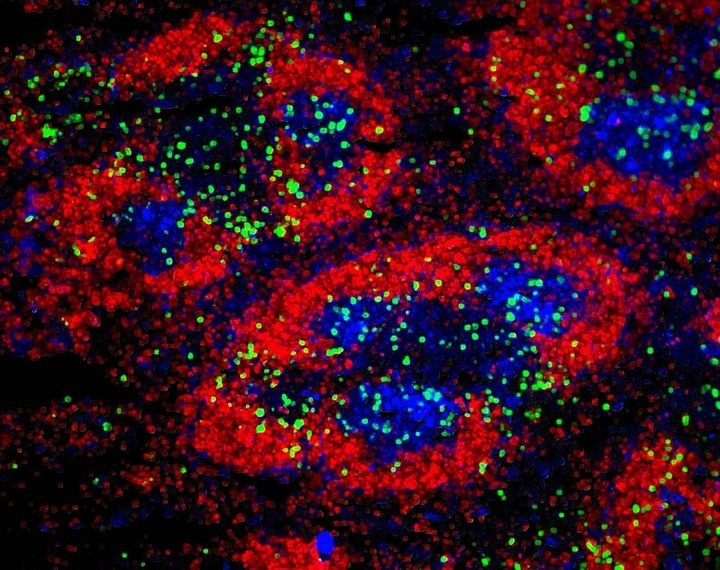The activated PI3K Delta syndrome 2 (APDS2) is a rare genetic disease that is caused by cellular anomalies, according to experts from the Garvan Institute of Medical Research. Genetic abnormalities that affect immune cell signaling via the protein PI3K are the root cause of the disease.
 The immune system’s T cells (green) helping B cells (in the red zone) to make antibody responses inside the spleen. Image Credit: Garvan Institute of Medical Research
The immune system’s T cells (green) helping B cells (in the red zone) to make antibody responses inside the spleen. Image Credit: Garvan Institute of Medical Research
This study tells us how signaling in the immune system needs to be tightly balanced to make an effective response to infection. Sometimes it is turned down and you have a problem, and sometimes signaling being turned up can interfere with an immune response.”
Elissa Deenick, Study Senior Author and Co-Lead, Precision Immunology Program, Garvan Institute of Medical Research
Deenick is also the head of the Lymphocyte Signaling and Activation Lab.
The activation of immune cells for growth, proliferation, survival, migration, and function depends heavily on PI3K. The researchers discovered that the genetic polymorphisms in APDS2 and APDS1, a condition that is similar to APDS2, alter PI3K signaling in various ways, having varying implications on the immune system.
Although the APDS conditions have similar effects, they develop through separate genetic pathways. APDS2 is caused by changes in the PIK3R1 gene, whereas APDS1 is caused by abnormalities in the PIK3CD gene.
Despite the fact that both enhance PI3K signaling, the small distinctions between them—in particular cells, periods of time, and mechanisms—result in different immune reactions.
In APDS2, fewer responding B cells are created in response to vaccination, but in APDS1, the number of T cells is reduced. However, in both situations, the differences result in inadequate antibody responses. Furthermore, APDS2 changes appear to influence non-immune cells, causing growth delays.
These findings also provide information regarding the signals necessary to elicit outstanding vaccine responses in general.
Even for people who don’t have these two rare genetic conditions, other genes can impact these pathways—which could contribute to why different people have varied responses to vaccinations.”
Dr Tina Nguyen, Study Co-Lead Author and Research Officer, Garvan Institute of Medical Research
The research shows how immune defect or insufficiency can originate from even slight deviations in immune cell signaling, which must be precisely calibrated. They represent an important advance in the direction of unraveling molecular mechanisms and creating more specialized and efficient treatments for diseases.
People with mysterious conditions often face challenges in obtaining an accurate diagnosis and understanding the root causes of their health issues. With better access to genomic testing, it is going to become much easier for patients to receive diagnoses for conditions like APDS2. Knowing the genetic basis of a disease can enable targeted, personalized treatment plans that give patients the best chance of effective management or, hopefully over time, a cure.”
Stuart Tangye, Study Senior Investigator and Head, Immunobiology and Immunodeficiency Lab, Garvan Institute of Medical Research
The Journal of Experimental Medicine published the study.
The next stage is to research ways to monitor each patient’s reaction to treatment and to create blood tests to check on immune function and health. This will allow the correct drug to be administered at the appropriate time and dose.
Source:
Journal reference:
Nguyen, T., et al. (2023). Human PIK3R1 mutations disrupt lymphocyte differentiation to cause activated PI3Kδ syndrome 2. The Journal of Experimental Medicine. doi.org/10.1084/jem.20221020